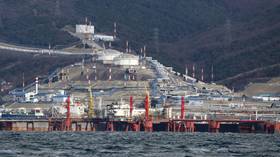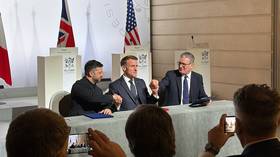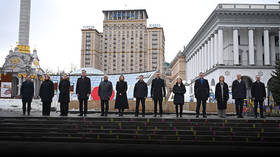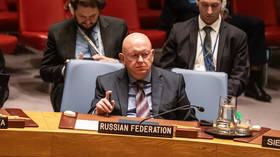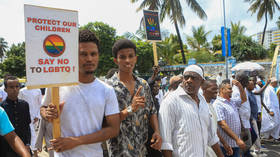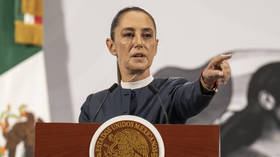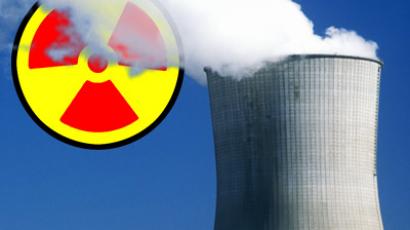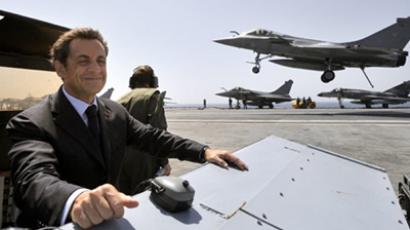Missile defense and the Euro priority for G8 leaders
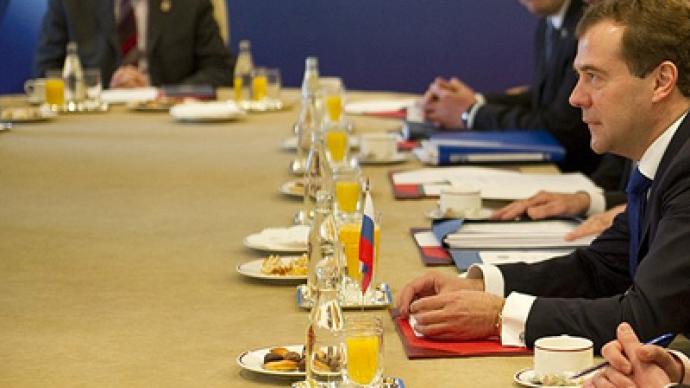
Deauville, a historic World War II site and paradise for the French elite, is seeing an invasion of the G8 machine. Russia, the USA, the UK, Japan, Italy, France, Germany and Canada – are discussing their top priorities.
On the sidelines of the summit, US president Barack Obama said that Russia and the USA are committed to finding a common approach on American plans to build an anti-missile defense shield in Europe.Still, any kind of solution is not expected to be reached within the nearest future. “I told my friend Barack that it is likely that the missile defense question will be resolved in the future, probably, around 2020, so we have to lay the groundwork for future generations of politicians and the partnership of our countries in the future,” pointed out Russian President Medvedev at a joint press conference with Barack Obama. Obama replied that he is “committed to working together so that we can find an approach and configuration that is consistent with the security needs of both countries that maintains the strategic balance and deals with potential threats that we both share.”Despite signing the new Strategic Arms Reduction Treaty in 2010, the two countries are still separated by key differences, with Washington trying to persuade Moscow that the new US missile defense systems designed for Europe will pose no threat to the Eurasian country.President Dmitry Medvedev has also talked to his French and American counterparts to discuss issues connected with bilateral relationships.The Russian and French presidents told reporters on Thursday that their countries will eventually reach a definite agreement on the sale of four Mistral-class warships to Russia. The contract is due to be concluded within 15 days, the sides proclaimed. Two of the helicopter carriers will be built in Russia and two in France.Meanwhile, during separate economic talks at the summit, EU President Herman Van Rompuy told the gathering that the European Union will “not let the euro fail”. His statement came amid speculation that Eurozone member Greece might need additional help to avoid bankruptcy, though Rompuy refused to discuss further bail-outs for Greece in the course of the summit in Deauville.
Contemplating why the two leaders shifted the issue of creating missile defense until 2020, democratic strategist Chris Lapetina says that the presidents are being cautious in an attempt to avoid conflict.“For 50 years, the animosity towards each other [Russia and the USA] defined global politics. It has only been ten years that we’ve had a détente and now they are trying to figure out how to become friends, allies, if possible. I think, both sides are feeling each other out and some of these decisions are done quickly,” said Lapetina, underling that the most important thing is that the two leaders are sitting down together to find a solution to a conflict without being hostile to each other.
G8 talking nuclear and internet security
Following the Fukushima nuclear power plant disaster, nuclear security is also on the agenda at the gathering.“The issues of liquidation and the consequences of natural disasters and nuclear security will be discussed in detail,” Russian presidential aid Arkady Dvorkovich said. “We expect that the first summit session will be devoted to this.”Dvorkovich added that Russia has come up with a number of initiatives which can help to implement measures that would increase security at nuclear sites. Other issues on the G8 summit’s agenda include the situation in Libya and other Arab states, recently hit by the waves of popular uprisings. All sides are expected to discuss the region’s issues, both at official summit sessions as well as in meetings taking place on the sidelines of the event. As the summit opens, US president Barack Obama is due to seek international support for aid to Tunisia and Egypt, AP news agency reported. G8 leaders are also expected to discuss regional security issues, including the situation around Iran’s nuclear program, the war in Afghanistan and separate conflicts in Africa. However, one topic comes as a new edition to the gathering. For the first time in the history of the G8 summit, leaders will discuss the Internet. Focusing on personal and intellectual property rights protection, they will also discuss the economic potential of the World Wide Web.
James Denselow, a London-based writer on Middle Eastern politics and security issues, believes that the G8 is a useful platform to discuss numerous issues which require multilateral co-operation between the powers, such as dealing with the world economy or military conflict in the world.“It’s no surprise that the G8 faces very similar issues each time it meets, because those are the issues that affect the world today,” he told RT.Denselow noted, however, that there is also room for a certain degree of innovation.“I think it’s interesting that Sarkozy is treating the conference slightly differently this year, inviting Eric Schmidt from Google and Mark Zuckerberg from Facebook to come and address the world leaders,” he said. “But ultimately, the core principles of what the G8 will deal with remain the same.”
Lode Vanoost, an international consultant and former deputy speaker of the Belgian Parliament, does not believe any harsh official rhetoric will be heard at the summit regarding the military operation in Libya.“These summits are never going to put one of their members in a bad spot,” said Vanoost. “What they do is find some diplomatic explanation that suits everyone and does not say a thing, but behind the scenes there is harsh debate.”Vanoost also disapproves of the “neo-colonialism” clichés the media uses to talk about the interference of the West in the Arab countries. “States do what they do for their own interests,” he said. “And if this is in their interest to re-conquer these countries, then this is what they will do. If this is in their interest to protect a democracy, this is also what they will do, but not for the purpose of democracy in principle, but for what will suit them for the moment. And for the moment, real democracy does not suit Europe. Democracies have one big flaw. They look after the interests of their own populations, not after the interests of American or European companies.”
E-G8 introduces Internet as a priority for Group of Eight
Right before the G8 summit, French president Nicolas Sarkozy initiated what has come to be called the e-G8 conference, bringing together world leaders in the information technology market. The event came as a prologue to the actual summit and its new topic – development of the Internet. The conference was expected to come up with recommendations for the summit, which came after different social media networks such as Facebook and Twitter played an important role in protests across the Arab world. Speaking at the conference, the French president stressed the importance of the so-called Arab Spring in the geopolitical arena. "This revolution is not owned by anyone, it does not carry a flag, it does not have slogans. This revolution belongs to us all," Nicolas Sarkozy said.




